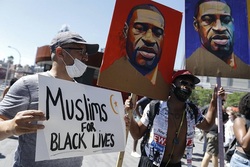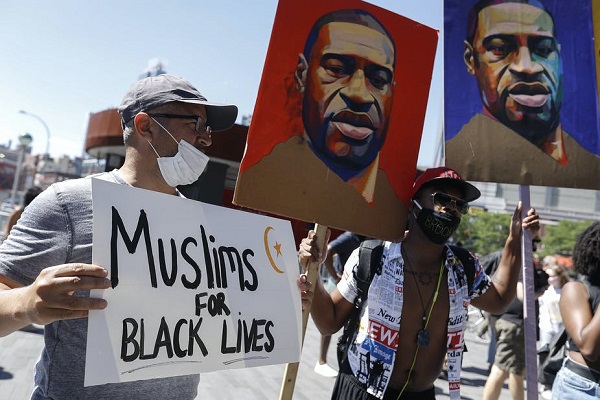Muslims in America Experience Over-Policing Too


Many of the worst dynamics at play now, including the militarization of police, were heightened in response to the attacks of September 11, 2001 and have made blameless Muslims prime suspects. While we engage in critical changes to the policing of Black Americans, we must work to ensure that Muslim Americans also benefit.
The use of law enforcement to subjugate, marginalize and persecute Black Americans is centuries old. In the 20th century, this occasionally intersected with Islamophobia, as when J. Edgar Hoover’s Federal Bureau of Investigation surveilled the Nation of Islam in concert with local police departments. But antagonistic policing of Muslims — Black and non-Black alike — has broadened significantly with the war on terror, which redoubled the militarization of police departments.
The rearmament of the police through federal programs such as the 1033 Program, which has allowed police departments to receive military hardware, emerged initially in the 1990s from the war on drugs. After 9/11, the Department of Homeland Security prominently expanded this program by offering grants to state and local law enforcement agencies, distributing equipment worth $7.4 billion among 8,000 agencies.
Among other news outlets, The Courant has reported on the extent of this equipment distribution. In the past two decades, local law enforcement in Connecticut has acquired than 3,000 military-origin items, including 19 MRAP vehicles specifically designed to counter explosive devices in Iraq and Afghanistan. Just last month, the Connecticut Police Chiefs Association declared a moratorium on such acquisitions and a review of the program.
But it was not simply some of the police equipment that had been shaped for war abroad, but also increasing numbers of police officers. Although some have argued that military training might lessen an officer’s use of violence, a 2014 study published in the Journal of Public Health argued the opposite. It found that Dallas law enforcement officers who had served in the military without deployment “were significantly more likely to be involved in a shooting than non-veteran officers.” Moreover, those who had deployed proved nearly three times as likely to be involved in a shooting as officers with no military training. Other studies discovered similar results in Albuquerque, Boston, and Miami. Undoubtedly, many military veterans turned police officers serve their communities well, but police training cannot easily displace the physical and mental disciplines and reactions developed in military training and honed in combat.
Given that military veterans from the last two decades have faced enemies (often while fighting alongside Muslim allies) in Afghanistan and Iraq, it is reasonable to ask what impact their experiences have when they enter the police force and encounter Muslim Americans or Muslim foreigners. Given that both wars were premised on the effort to combat Muslims targeting Americans (disingenuously, in terms of Saddam Hussein), one wonders what Islamophobic attitudes any law enforcement agent — but particularly those with combat experience — might carry and how police organizations might reinforce Islamophobia.
Indeed, various studies have determined that Islamophobic and anti-Muslim sentiments are not uncommon among law enforcement agents. In separate studies based on interviews with police in 2011 and 2015, the majority of those interviewed considered Muslims as dangerous and Islam as not a religion promoting peace. Both The Plain View Project and the news outlet Reveal found many examples of publicly flaunted prejudice by police. Not surprisingly, various polls have found many Muslim Americans distrustful of police and other law enforcement. Nevertheless, Muslim communities have proven instrumental allies of law enforcement in the effort to deter violence by its own members.
One of the most egregious instances of police aggression toward Muslims was the NYPD Muslim Surveillance Program. From 2001 until 2014, police — having coordinated with the CIA — spied on mosques, bookstores, restaurants and Muslim student groups in the city and surrounding areas, even recording the names of those attending prayers. The unit admitted in 2012 that its exertions developed no leads or new investigations. Demonstrating the mutual recognition of their shared cause against lawless policing, Muslim American and Black Lives Matters organizers have coordinated to force the NYPD to release documents it hid from Freedom of Information Act requests.
From the Patriot Act of 2001 to President Donald Trump’s “Muslim ban” in 2017 and beyond, Muslim Americans have been scrutinized and surveilled by law enforcement to an extraordinary degree while many Muslim visitors have been harassed and deported simply due to their religious identity. The Black Lives Matter movement’s call for systematic changes to policing should also ensure more equitable treatment for all Americans.
By Peter Gottschalk
Source: Hartford Courant
Peter Gottschalk is professor of religion at Wesleyan University and co-author of “Islamophobia and Anti-Muslim Sentiment: Picturing the Enemy.”



